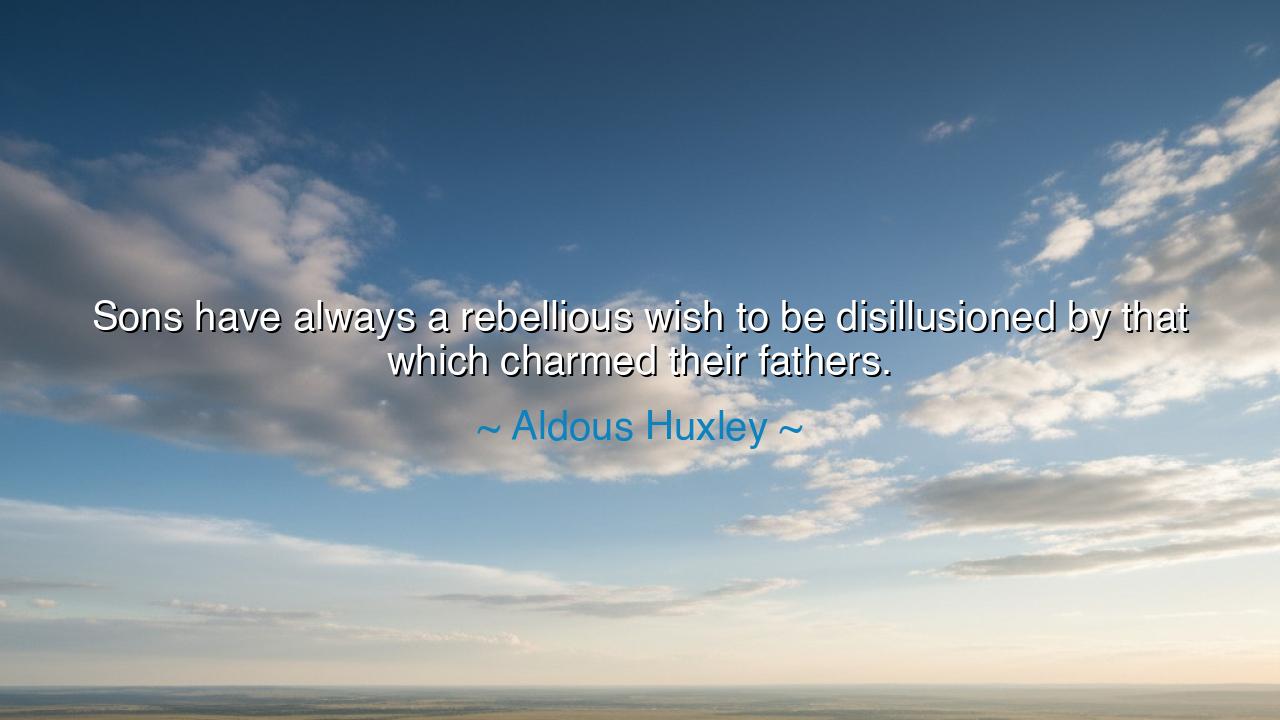
Sons have always a rebellious wish to be disillusioned by that
Sons have always a rebellious wish to be disillusioned by that which charmed their fathers.






The words of Aldous Huxley, “Sons have always a rebellious wish to be disillusioned by that which charmed their fathers,” strike deep into the heart of the human condition. They are not merely an observation about family or youth—they are a revelation about the eternal rhythm of generations, the ever-turning wheel of renewal and rebellion that propels mankind forward. Huxley, whose mind was both sharp and philosophical, saw in this struggle between father and son, between the old and the new, the essence of history itself. Every generation, he suggests, must destroy the illusions of the one before it—not out of hatred, but out of necessity. For progress is born from rebellion, and truth often rises from the ashes of what was once adored.
To understand this rebellious wish, one must first understand love itself. The son loves his father, but his love is not blind; it is restless, questioning, and alive. He sees the father’s world—the beliefs, traditions, and passions that shaped him—and feels both awe and unease. What the father calls wisdom, the son calls limitation; what the father calls beauty, the son may call illusion. Thus, the son’s rebellion is not against the man, but against the boundaries of his world. In his longing to find truth for himself, he seeks to disillusion—to peel back the veil and see reality naked and unadorned. It is through this breaking of illusion that he becomes a man in his own right.
This tension between generations has echoed through every age. Consider the story of Prince Siddhartha, the man who would become the Buddha. His father, King Suddhodana, sought to shelter him from all suffering, surrounding him with luxury and pleasure. To the king, happiness was found in control, in the perfect preservation of comfort and beauty. But Siddhartha’s soul rebelled. He longed to see what lay beyond the walls of his father’s palace, to know the truth of life and death. When he finally stepped outside, he was disillusioned by what he found—sickness, old age, and sorrow. Yet from that disillusionment came enlightenment. What had once charmed his father became the illusion he transcended. Huxley’s wisdom lives in this story: every generation must see for itself, must dare to question what the previous one has accepted as truth.
Huxley himself, born into a family of scientists, philosophers, and intellectuals, understood this deeply. His forefathers believed in the triumph of reason, the certainty of science, and the steady march of human progress. But Aldous saw a darker truth: that knowledge alone cannot save the soul. In his works, such as Brave New World, he rebelled against the blind optimism of his father’s generation. He stripped away the illusion of progress and revealed its hidden price—the loss of freedom, of love, of meaning. His rebellion was not destructive, but revealing. It was the son’s sacred task: to confront what charmed the fathers, and to discern what in it was true and what was false.
There is both sorrow and beauty in this cycle. For the father watches his son turn away from what he held dear, and feels his own world tremble. Yet if he is wise, he understands that this rebellion is not betrayal—it is renewal. The son’s disillusionment is the fire that purifies the old and gives birth to the new. In this way, humanity evolves. The rebellion of the son ensures that the wisdom of the father does not become dogma, that life remains a river and not a stagnant pool. Every generation must question the idols of the last, lest those idols become the prison of the spirit.
But there is danger, too, in rebellion without reverence. When the son destroys without understanding, when he mocks without learning, he risks becoming rootless, cut off from the very soil that nourished him. The wise son rebels not to reject the past, but to refine it—to take from his father’s vision what is eternal and cast away what is vain. Likewise, the wise father does not demand blind obedience, but welcomes the courage of the next generation. He knows that truth must be rediscovered in every age, that no man inherits wisdom—he must earn it anew.
So, my listener, take this lesson to heart. Rebellion and disillusionment are not acts of destruction, but of discovery. Do not fear to question what your fathers cherished, but do not despise them for having cherished it. They saw truth in their own time, as you must see it in yours. Learn from their vision, but trust your own eyes. Tear down the illusions that no longer serve life, but keep the foundations of love and respect intact.
For this is the eternal dance of humanity—the father builds, the son rebuilds; the father dreams, the son awakens. Each generation must pass through the fire of disillusionment to forge its own truth. And when your own children, in their turn, challenge what you have built, smile upon them as they tear down your illusions—for they, too, will be seeking the light that lies beyond your shadow. Thus does wisdom endure—not as a monument, but as a flame, passed from father to son, each burning in his own time.






AAdministratorAdministrator
Welcome, honored guests. Please leave a comment, we will respond soon